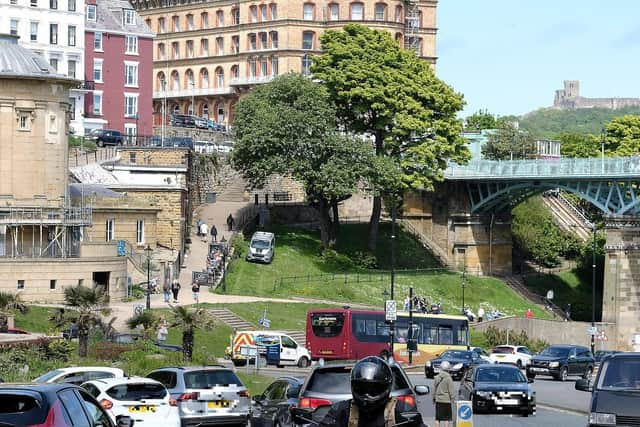Scarborough councillors must 'walk the walk' to tackle borough's climate change goals


The cabinet today met to discuss the authority’s draft climate change strategy which looks at switching to electric vehicles, reducing staff journeys and moving to traffic-free seafronts as a way for it to become carbon neutral by 2030.
The borough authority declared a Climate Emergency in January 2019 committing the council to doing all it can to meet its target to reduce its carbon footprint.
Advertisement
Hide AdAdvertisement
Hide AdA review by a climate change task group made up of councillors found that the biggest contributing factor to the council’s carbon footprint was its fleet of vehicles, including its bin lorries, and that the authority should look to switch as many as possible to being electric vehicles (EV) or hydrogen powered.


'Politicians should walk the walk'
Staff journeys, which amounted to 240,000 miles in 2019/20 also came under the microscope.
During today’s cabinet meeting the portfolio holder for Environment and Sustainability, Cllr Michelle Donohue-Moncrieff, asked why councillors were not included in the document.
She said: “One point that struck me is we talked a lot about staff and what staff could do but we never said what councillors were going to do, are we not going to lead?
Advertisement
Hide AdAdvertisement
Hide Ad“Because one of the problems, I think, is the public perceives, and this is not criticism of anybody here, that politicians are very good about talking about climate change, very good about telling people what they should be doing but not necessarily very good at walking the walk themselves.”
Cllr Donohue-Moncrieff said that some non-formal meetings of the council can be held online to cut down on journeys from councillors.
Cllr Phil Trumper, the chairman of the Climate Change task group, said that holding online meetings would help to reduce the council’s carbon footprint, he also suggested that councillors could car share when it came to trips such as site visits by planning committee members.
The task group came up with five strategic objectives for the council to meet its climate change commitment, which were put before the cabinet.
Advertisement
Hide AdAdvertisement
Hide AdThese are to decarbonise the council’s fleet and equipment through a planned electric and hydrogen transition, decarbonise the council estate through energy efficiency measures and utilising green energy, promote zero emission transport in staff business travel and commuting, minimise emissions embedded in the procurement and consumption of goods and services and embed net zero thinking into every aspect of the council’s culture.
'Traffic-free seafronts and e-scooters'
To do this the task group wants the council to explore by 2023 the possibility of having traffic-free seafronts and bringing e-bike and e-scooter schemes in urban areas.
Concerns were raised at the cabinet meeting about the potential for the traffic-free seafronts.
Cllr Janet Jefferson, the portfolio holder for Corporate Resources, said: “My main focus I was wanting to talk about was the aspiration for the potential traffic-free seafronts.
Advertisement
Hide AdAdvertisement
Hide Ad“I am just wondering how much the task group has really considered this and what the implications are.
“Our seafronts at both Scarborough and Whitby have working harbours and a working harbour has got to enable traffic 24/7.”
Cllr Jefferson added that when Scarborough’s seafront was closed last year as part of social distancing measures it led to traffic congestion in other parts of the town.
She added: “Once you close a road you just move the carbon [emissions] elsewhere.”
Advertisement
Hide AdAdvertisement
Hide AdCllr Trumper accepted that the traffic-free aspiration was “contentious”.
Harry Baross, the council’s Climate Change and Carbon Reduction officer added: “This is not something we are saying we are absolutely going to do because we don’t know if it will be a good idea or not.
“We are trying to see what works and what doesn’t”.
The cabinet accepted the report but asked for more work to be done on areas including the role of councillors, how electric charging points would be provided in terraced streets and the creation of a Climate Change Impact Assessment tool that would be used to test all council proposals for their green impact.